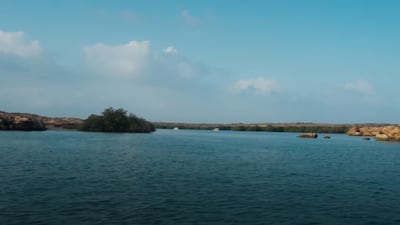Filmmakers have often been drawn to the ocean and the tragedies that can befall those unaware of its power. Naturally, James Cameron’s epic Titanic springs to mind. Or more recently, J C Chandor’s sublime All is Lost, starring Robert Redford as a lone sailor desperate to survive his predicament. Playing at the Red Sea International Film Festival, Saudi production Farasan Boat: 128km Away from Anchorage may not enjoy the same budget or scope as these Hollywood epics, but it’s no less tense or taut.
The drama-documentary is set in 2016. It follows three friends Ali, Mohammed and Abdulaziz as they take a fishing trip around Farasan Island, off the coast of Jazan. Interviewed on camera, in a studio setting, their compelling recollections are recreated by filmmaker Mowaffaq Alobaid, who smartly conjures up a journey that swiftly mutates into a nightmare. At its heart is their cocksure guide Abu, seemingly a legend in his own mind – he claims to be famous on YouTube and goes by the motto: “Don’t lose your love”.
Abu, who refused to be interviewed for the film, leads this posse out into the ocean, at one point claiming he can navigate by the stars. But what is meant to be a few hours out at sea soon leads to these young men hitting the panic button, as Abu loses his way, phone signals disappear and the weather inevitably turns, with dark clouds gathering ominously. Soon, fuel, water and food supplies dwindle, while anxiety spreads among the youngsters like wildfire.
Yet this is just part of the fear that creeps through this film. Much of it revolves around Abu and the boys’ paranoia towards their host. Does he have an ulterior motive for getting them lost? Gradually, the passengers come to realise they are no longer near any Saudi land, but the boat has floated into Yemeni waters and is in the middle of a war zone. Could Abu be delivering them into the hands of extremists, perhaps for financial reward?

As tense as the film feels – the director mixing colour and black-and-white images – there are moments of humour, or perhaps hysteria. At one point, as Abdulaziz relieves himself on the makeshift toilet, a stork lands on the boat and sticks its beak through the window. Rather than bring this to life as live action, Alobaid uses animation, a surprisingly effective choice that adds further texture to an already unique-feeling film.
Farasan Boat runs for just over an hour, although viewers won't feel short-changed. Some movies say all they need to swiftly, and this film feels like one of them. Indeed, the only thing long about this is the mouthful of a title, one that arguably should be revised if the film hopes to travel to territories outside the Middle East. This aside, it feels punchy, especially in the epilogue, as we learn that depression, insomnia and panic attacks afflict Ali and his friends in the wake of this horrifying odyssey.
Divided into sections, with titles like "A struggle to survive", it’s a film that admirably conveys just how easily things can sour when we least expect them. In some ways, it’s about appreciating what we have. “The blessing of a second chance in life,” as Mohammed puts it. Higher powers are prayed to. But whatever our beliefs, there is a palpable sense of mortality in the film; that life is fragile and can be snatched away at any moment. Rarely has the sea been such a cruel mistress as it is here. Vast and lonely, it can swallow up a human being in an instant.

